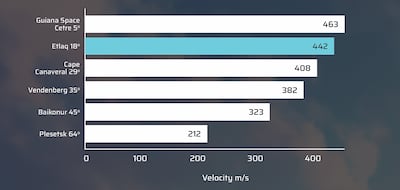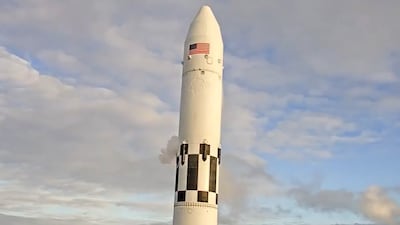An American company has expressed interest in launching its rockets from a spaceport that Oman is developing in its port town of Duqm.
The ABL Space Systems and Oman’s Etlaq Spaceport signed an agreement last week to explore possibilities of launching the company’s RS1 rockets.
They did not say when the launch would take place, but it could be nearer the end of the decade, depending on the progress of the rocket and spaceport.
If these plans go through, it would help bring satellite launch capability to the Gulf, helping to significantly boost the space sector in the region.
“The Gulf region space ecosystem is growing immensely, with new investment and large ambition in exploration, science missions and constellation deployment,” Harry O'Hanley, chief executive of ABL, said.
Oman announced plans to build a spaceport that supports all sizes of launch vehicles in 2022, with the site being able to host some launches by 2027 and becoming fully operational by 2030.
Azzan Al Said, chairman of Nascom – the company overseeing the project, had told The National earlier this year that the spaceport would have three launch complexes to host medium to large, small to medium and micro rockets.

The port’s equatorial positioning makes it an ideal spot for launches, as the rockets can take advantage of the Earth’s rotational speeds.
“The only other port closer to the equator is the one in French Guiana, but we don't see them as direct competitors because those are in completely different hemispheres,” said Mr Al Said.
“The other reason that makes Oman attractive for space launches is that [to] the east is the Arabian Sea and the Indian Ocean.
“Having that downrange clearance makes it much more favourable and safer for launches to take place without putting people in harm's way.”
ABL's rocket yet to reach orbit
The company attempted to launch the rocket on its maiden flight in January 2023 to deliver miniature satellites into orbit from an Alaskan spaceport.
It, however, failed after suffering a complete loss of power 10.87 seconds after lift-off.
The company is planning to launch the rocket on its second flight later this month from Alaska.
The RS1 rocket is a small, expendable two-stage launch vehicle that can carry payloads of up to 1,350kg to low-Earth orbit.
It aims to provide low-cost access to space for small satellites and other payloads.
Strict laws for US rocket companies
Before ABL can launch from Oman, the company needs to ensure it meets the legal requirements listed in the International Traffic in Arms Regulations (ITAR).
The US regulations restrict American companies from exporting certain technology, which could explain why companies such as Blue Origin and Virgin Galactic have not been able to launch their space tourism flights from the Middle East, despite expressing interest.
A statement by Etlaq Spacesport said the agreement signed with ABL also focuses on “developing regulatory and export control frameworks with both the US and Oman governments”.
Mr Al Said had earlier told The National that Nascom would work towards “removing that barrier” once it starts getting interest from launch companies.
“There are things such as ITAR and safeguard agreements which would have to be put in place between Oman and the United States for them to operate here,” he said.
“It's a regulatory barrier but it's one that's easy to open up discussion on once we actually get interest.”


